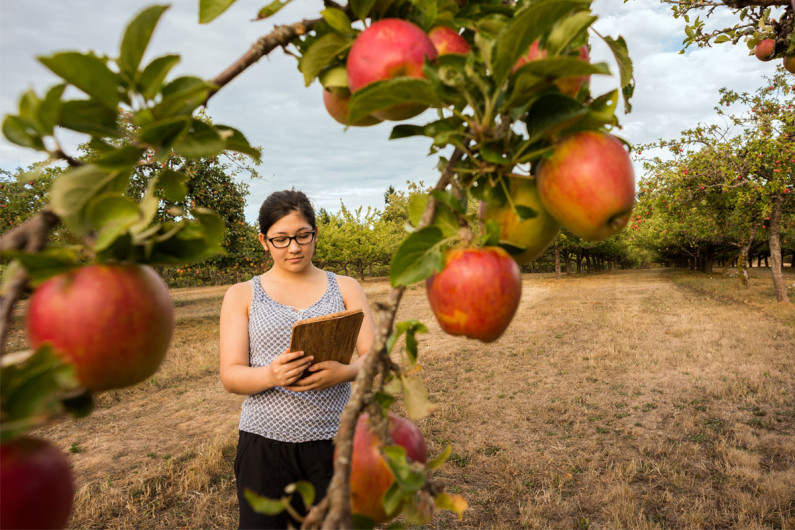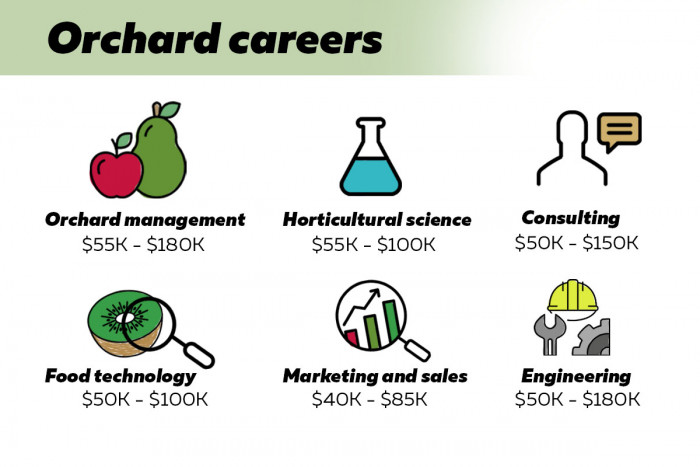Progress your career in pipfruit

Develop your career and earn more in the world-class pipfruit industry.
What's on this page?
The pipfruit industry is growing, jobs are in demand and there are opportunities for career progression.
Apart from apple and pear growing, there are other areas of the industry which support fruit production, including science, technology and marketing.
With a range of career pathways you have opportunities to earn more, upskill in new areas and develop skills used in orchards and packhouses in New Zealand and around the world.
Qualifications pathway
Getting a horticulture qualification can help you progress through jobs in the pipfruit industry, whether you’re a career changer or school leaver.
You can start studying or training in fruit production while you’re working, or you can study part or full time for horticulture qualifications such as:
- Certificate in Horticulture Production (Level 2)
- Certificate in Horticulture Apprenticeship (Level 3 and 4)
- Diploma in Horticulture (Level 5 or 6)
- Bachelor of Horticultural Science degree
Types of pipfruit jobs
In the packhouse
Plenty of entry-level roles are available in packhouses. You can start as a grader, labeller, packer, stacker, strapper, tray prepper or coolstore worker.
Packhouse workers can progress into forklift operating with training. Experienced or trained workers can move into supervising roles, line management, data management, or working in logistics.
Line managers ensure the quality of lines of fruit being processed in packhouses comply with industry standards.
Mechanical engineers make sure packhouse machinery runs smoothly.
After the fruit leaves the packhouse, marketing specialists promote and develop sales of pipfruit brands.
In the orchard
Crop workers can start by picking fruit, monitoring crops, operating hydraladas, and pruning or thinning.
Crop workers can become team leaders, shift supervisors, consultants or horticultural field representatives with experience or training.
Consultants give business, technical and environmental advice to orchardists. Horticultural field representatives sell products and give crop advice to orchardists.
In the laboratory
Food technology, research science or quality assurance roles involve ensuring apples and pears all look and taste the way they should and are healthy to eat.
Pre-harvest crop monitors survey orchards and identify pests and diseases. They also assess any damage that may have been caused. Pre-harvest, harvest and post-harvest quality controllers collect fruit samples and test for maturity.
With training you can move into horticultural science roles and specialise in areas such as entomology (studying insects).
Pipfruit jobs you can move into with experience or training
Pipfruit orchard career salaries
Find out more
Sources
- Heywood, Evan, orchard manager, Golden Bay Fruit and Apples and Pears NZ Board member, careers.govt.nz interview, 18 October 2019.
- Horticulture NZ, 'Our Food Future: Annual Report 2019', accessed August 2019, (www.hortnz.co.nz).
- New Zealand Apples and Pears, ‘Follow the Journey of New Zealand’s Apple’, accessed October 2019. (www.pipfruitnzstories.co.nz).
- Pick NZ, ‘Work Opportunities, Job Roles’, accessed October 2019, (www.picknz.co.nz).
- Plant and Food Research website, accessed October 2019, (www.plantandfood.co.nz).
Updated 8 Jan 2020
